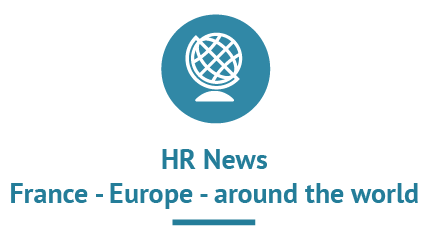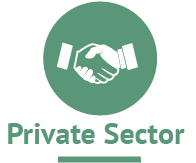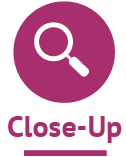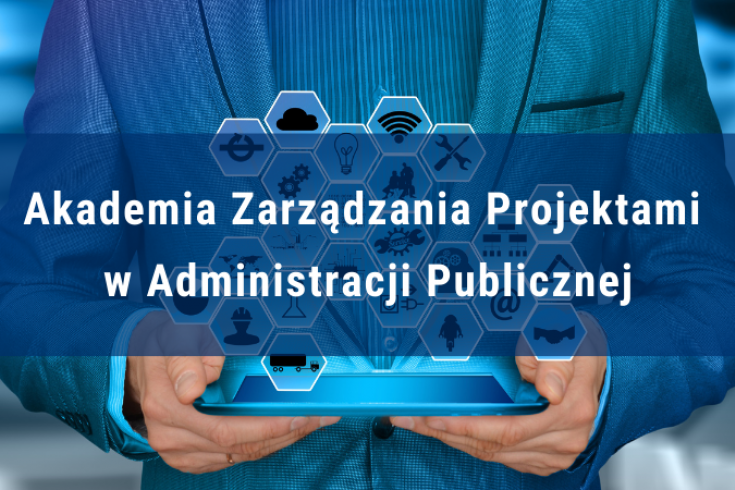|
If you are having trouble viewing this email, open it with your internet browser,
download the PDF version
or contact us.
|
 |
| #36 - June 2021 |
| PDF version - Manage your subscription - Search - Archives |

|
|
vision RH is a newsletter published by the French Directorate General for Administration and the Civil Service (DGAFP). It draws on information sources and reports issued by public administrations, the private sector, international organisations and the press, in several different languages. It aims to provide a broad view of current human resources and civil service initiatives.
|
|

|

|

|

|

|
| Europe: changing the way EU officials are selected | |||||
|
The European civil service, which is based on a set of Staff Regulations and a career system, is considering changes to its selection method. A report by the Court of Auditors has shown that the method used is suitable for generalist profiles, but less so for the specific professions that make up the staff of each of the Union's agencies. It makes a series of recommendations to improve responsiveness and appeal. |
|||||
|
|||||
|
|
|||||

|
|||||
| Germany: Act on physical appearance and presentation | |||||
|
The Federal Government has harmonised the rules on the wearing of certain external signs. A new act now allows public employers to state that any modification of a person's appearance that does not comply with the obligation of neutrality (excessive and visible tattoos, ostentatious wearing of accessories but also of community or religious signs) is incompatible with the exercise of the person's function. |
|||||
|
|||||
|
|
|||||

|
|||||
| Canada: FlexGC, the self-help community for remote working | |||||
|
Among the many online communities available to public servants across the country, the latest one is dedicated to the massive deployment of remote working imposed by the pandemic. Its aim is to provide support to all those who are experiencing difficulties in their organisation. The members are from different sectors, backgrounds and locations and are facilitating the transition by sharing their experiences. « Our approach is human-centered to help our colleagues identify and adapt to the tools, practices and mindsets they need »
|
|||||
|
|||||
|
|
|||||

|
|||||

|

|
| Spain: a new recruitment strategy for central government | |||||
|
After a series of discussions, the Ministry presents the new strategy it intends to implement for all recruitment activities by 2025. The draft executive plan aims to halve the length of the procedure, pool competitions with similar tests and boost the portion related to know-how and interpersonal skills. Members of the jury will have to undergo training to maintain their qualifications. |
|||||
|
|||||
|
|
|||||

|
|||||
| Denmark: the government opts for hybrid learning | |||||
|
As with the workplace, training is being organised in a different way, moving towards a blended learning model. The Campus platform is expanding its range of services and now offers various institutions the opportunity to work together on integrated programmes. It will host the portion of training courses devoted to the individual acquisition of knowledge in addition to the collective workshops for practical work carried out on site. |
|||||
|
|||||
|
|
|||||

|
|||||
| France: a coaching and mentoring partnership in Seine-Saint-Denis | |||||
|
"Dare to be a civil servant in Plaine Co" is an initiative launched by the association La Cordée to support students, job seekers and people changing careers based on social and geographical criteria. Volunteer civil servants act as mentors in playful workshops, job dating, inspiring gatherings and visits to the administration to help them build their career plans. « A collective, dynamic and interactive path and a mentoring free of charge to help you with your professional project and your job search »
|
|||||
|
|||||
|
|
|||||

|
|||||

|

|
| Italy: open data portal on the prevention of corruption | |||||
|
The authority in charge of preventing corruption in the public sector has decided to put data on line - in full transparency and with respect for data privacy. Through a dashboard and analytics, users can access declarations related to potential conflicts of interest (public contracts, hiring proposals, etc.). |
|||||
|
|||||
|
|
|||||

|
|||||
| Austria: a leadership diploma for senior managers | |||||
|
Developed in partnership with the Hernstein Institute and the University of St. Gallen and coordinated by the Federal Academy, a leadership degree is being promoted to senior managers. Initially, proven concepts and methods are taught to enable participants to reflect on their own behaviour. A subsequent analysis determines the capabilities and individual coaching hours are allocated. |
|||||
|
|||||
|
|
|||||

|
|||||
| Netherlands: an evolving quality framework for the digital sector | |||||
|
The 61 digital professions in the Administration, which are already grouped in a channel (Group IV), are now covered by a reference framework that ensures the homogeneity of profiles while facilitating career paths. This tool has become essential for promoting mobility and responding to changing needs. It is also intended to provide departments with an overview of the expertise they hold. « With this quality framework, you have a faster and more precise overview of the IT expertise within your organization »
|
|||||
|
|||||
|
|
|||||

|
|||||

|

|
| United Kingdom: shared workspaces for public servants | |||||
|
Managing office space rationally in the face of declining staff numbers is becoming a growing concern for property departments. In response, and particularly in the case of new locations outside London, they have decided to rent shared workspaces from the country's leading provider in a dozen cities. |
|||||
|
|||||
|
|
|||||

|
|||||
| Ireland: "Building Momentum", a new agreement for civil servants | |||||
|
Drawing several lessons from the health crisis, the "Building Momentum" agreement was presented to trade union representatives. The Administration is committed to entering into discussions and negotiations on a number of points: a framework for flexible working, alignment of technical grades with their administrative counterparts, increased mobility, professionalisation (HR and ICT) and a learning plan. |
|||||
|
|||||
|
|
|||||

|
|||||
| France: "Iota", the regional project on occupational health and safety | |||||
|
On the initiative of inspection officers in the Gard département, a software application has been adopted and developed by the IT Public Interest Group of the management centres. IOTA (which stands for "Inspection, Observation, Territory, Improvement") contains an up-to-date regulatory database and allows users to enter their statements and findings with the help of a grid, so that they can concentrate on making recommendations. « Now, we fill in the tables on the software during the visit and we just have to write recommendations. We save time »
|
|||||
|
|||||
|
|
|||||

|
|||||

|

|
| Malakoff Humanis: returning to the office without taking a step backwards | |||||
|
At the end of the health crisis, every professional sector that has been obliged to make massive use of telework is facing a major challenge: finding the right balance between the company's needs and the employees' expectations, which have changed. Malakoff Humanis, which specialises in social protection and has carried out several studies on changes in the world of work over the past 15 months, has conducted a thorough review of its own organisation. A consensus emerged fairly quickly that there was no question of going back to the way things were before. Based on the results of the internal surveys, new plans were drawn up that took into account the needs expressed (work/life balance, but also the need to rebuild a collective environment). The management first brought together all 1,200 managers with the aim of winning over the last few who were reluctant to adopt the hybrid mode that had been chosen (two days on site and three days remotely). Upon their return, the employees also discovered the improvements that were made to accompany this transformation: modular offices, user-friendly spaces and improved acoustics. According to the management, it is essential to show those who are apprehensive about returning to their workplace (1) that it will be mainly reserved for group activities, which are necessary for cohesion.
|
|||||
|
|||||
|
|
|||||

|
|||||

|

|
| A project management training unit for Polish civil servants | |||||
|
Because a project-based approach disrupts the traditional structure of organisations, it must be convincing if it is to gain a foothold in administrations, which are still very much steeped in a strong hierarchical culture. Adapted to managing specific and/or cross-functional missions, which are becoming increasingly numerous in the public sector, project mode also requires specific skills. With this in mind, the Lech Kaczynski National School of Public Administration in Warsaw - which is responsible for the initial and ongoing training of civil servants - has set up a Project Management Academy (1). The Academy is an independent institution created to "improve the implementation of projects by enhancing the skills of staff and optimising the management of available resources". .
Any public servant who is expected to contribute to a project, regardless of his or her level of function or responsibility, is invited to apply. The programme coordinators ensure that the range of profiles (and in particular the participation of senior managers) within each class is one of the keys to success. The programme consists of several taught modules, delivered in blocks and at short intervals, using theory and practice to explain project management techniques and tools – as well as programme and/or portfolio management issues – using methodological documents and materials developed by recognised experts. Successful projects also depend on factors that are sometimes given short shrift, including socio-economic justification, balanced and efficient division of labour, and interpersonal and organisational relations. All of these issues are addressed in case studies in a workshop setting with the support of specialists. Planning, risk management and evaluation are key elements and form an important part of the training. Analysis of real-world projects within the administration is used as the basis for exercises that the participants must solve both individually and collectively. A partnership has recently been signed with HAUS, the Finnish government training operator, and LUDOVIKA, the Hungarian University of Public Administration, in order to secure the services of trainers from other countries and give the academy an international dimension.
|
|||||
|
|||||
|
|
|||||

|
|||||

|
|
Share
|
||||
|
||||
| SUBSCRIBE - UPDATE YOUR SUBSCRIPTION - ARCHIVES - RSS - UNSUBSCRIBE |
|
French Directorate-General for Administration and the Civil Service (DGAFP)
Publication Manager: Nathalie COLIN Managing Editor: Nathalie GREEN Editor-in-chief and Autor: Jean-François ADRIAN Layout and graphic design: Jean-François ADRIAN and Aphania. The texts of the publication do not reflect the point of view of the DGAFP
In accordance to the French Act n°78-17 of 6 January 1978 on information technology, data files and civil liberties and to the european General Data Protection Regulation (GDPR), your personal data is stored securely and you are entitled to access, correct and delete them. To do so, you should send an e-mail to (contact-visionrh@kiosque.bercy.gouv.fr) or write to DGAFP: 139, rue de Bercy - 75012 Paris; France.
Reproduction is authorized with mention of the source © DGAFP 2021 / N° ISSN: 2606-7528. |
|
|






